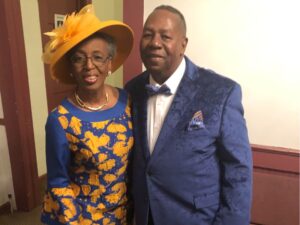Reverend Leroy Wright has always known there was a spiritual calling on his life. While he did not officially join the clergy until his forties, he has been in service to the community, and the historic Westside, throughout his life.
Originally from Savannah, Rev. Wright moved to Atlanta to attend Morehouse College where he studied business administration and psychology. During his time as a student, he began to learn about Civil Rights protests taking place around the community, as professors and students organized to speak out against systemic racism against Black people. Rev. Wright was looking for job opportunities when he saw a notice that the Atlanta Police Department was hiring.
“A lot of us at Morehouse were first-generation college graduates; we didn’t have any money and we needed a job,” said Rev. Wright. “This was after the race riots [The 1967 Atlanta riots]. There was so much damage done to our communities and the Jewish businesses that provided credit and support to our neighborhoods.”
Rev. Wright officially joined the department in 1969 with the crime prevention unit focused on community service. After a few months, he was one of three Black men the department sent to the police academy and later became part of the riot control task force and various foot beats. He was also assigned to be a patrol wagon driver transporting people to jail. His last foot beat, with the force, was Vine and Magnolia.
During his time as an officer, he experienced discrimination from white policemen within the department. “I remember my superiors saying, ‘Boy what are you doing here?’” when I went to use the telephone in the squad room after my shift was over,” recalls Wright.
Looking to create change to the conditions for Black officers, he became part of the early effort to form the Afro-American Patrolman League, which helped bring equality in hiring, promotions, assignments, and working conditions for Black people within the Atlanta Police Department. After the creation of the Afro-American Patrolman League, he was drafted into the military and served as a Military Police Officer in the Army stationed in Fort Collins, Colorado for two years.
Following his military service, Rev. Wright went back to APD hoping to return to the force but found that his involvement with the Afro-American Patrolman League meant he would be blackballed from automatically rejoining the department. When he returned to Atlanta’s Westside, he was shocked by how much the neighborhood had declined in just a few years.
“It had changed – so much [of the neighborhood] had died. Vine and Magnolia used to be jumping – it used to have clubs, stores, a beauty shop, cab stand, Joe’s BBQ, and Rainbow drive in,” said Rev. Wright.
In the height of the 50’s and 60’s the historic Westside was home to nearly 50,000 residents. Today, after decades of disinvestment and depopulation, the current community size is 16,000.
Rev. Wright eventually took a job with Atlantic Building Systems, a division of Atlantic Steel, becoming the first Black person they hired to be on staff. He spent the next few decades of his life working as a businessman and entrepreneur.
It would be years later when the spiritual calling on his life would finally be answered. Rev. Wright and his family were attending Sunday service at St. Stephen Missionary Baptist Church in East Point when the pastor, Rev. Earl L. Calloway called him to the pulpit. Rev. Wright obliged, unsure of the pastor’s true request. The following Sunday he returned to the church, again sitting in the pew with his family when he was once again called to the pulpit by the senior pastor.
“He said ‘Roy, didn’t I tell you to come up here? I’m not going to tell you anymore,’ recalls Rev. Wright. “And that was the beginning of my pastoral journey. I said to myself if I am going to be in the pulpit then I need some theology education.” Rev. Wright attended the Interdenominational Theological Center (ITC) completing his master’s degree and later his doctorate in theology.
After serving for several years as part of church leadership at St. Stephen, Rev. Wright became the head pastor of First Thessalonian Missionary Baptist Church in 2011. The church was formed in June 1957 – it was originally a prayer band led by Rev. W. H. Waldon Jr. in his home. Later that year the band formed into a Mission and when it outgrew the apartment of the Rev. Waldon Jr. the members agreed to organize a church. Its first physical location opened in 1958 at 928 West Fair Street. It has been at its current location at 637 Joseph E. Boone Blvd for nearly 57 years. Today, the church’s congregation is made up of thirty-five members, many of whom no longer live in the historic Westside but still feel connected to their church home. The church has had several outreach efforts for the community including an annual block party. They also feed the community every 4th Saturday in partnership with St. Stephens MBC.
Westside Future Fund is grateful to Rev. Wright and all the community leaders and legacy residents who are a critical part of the vibrant history and future of the historic Westside. If you are interested in supporting the First Thessalonian and its community outreach efforts, please contact Rev. Wright via email at ftmbc@1thes.com.

